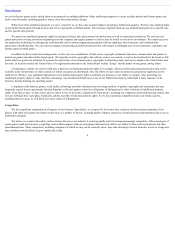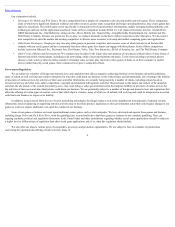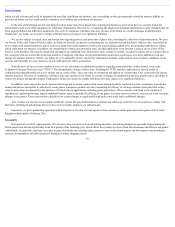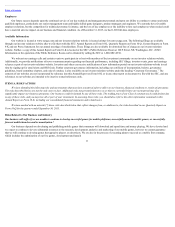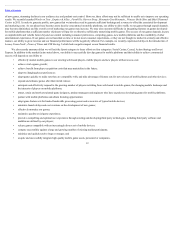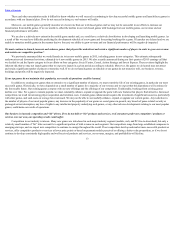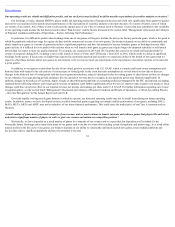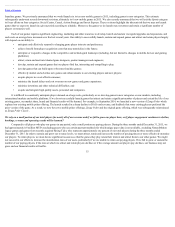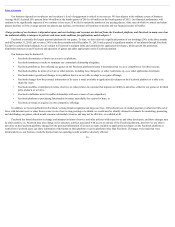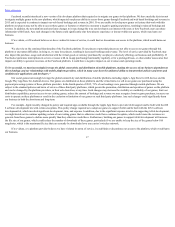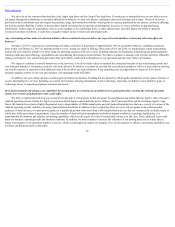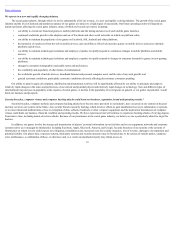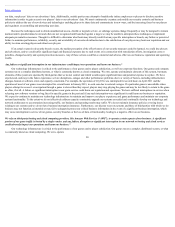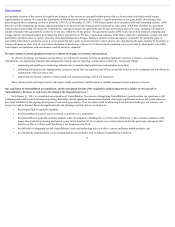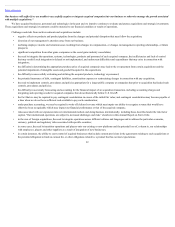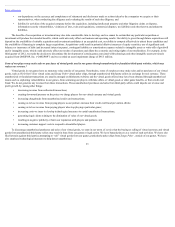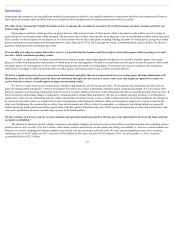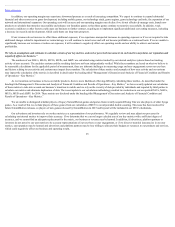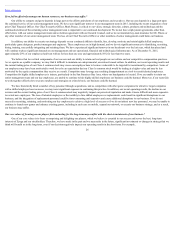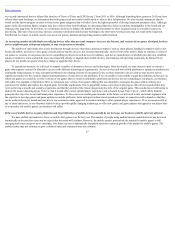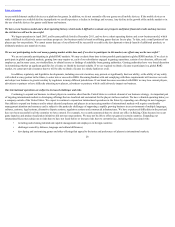Zynga 2015 Annual Report Download - page 21
Download and view the complete annual report
Please find page 21 of the 2015 Zynga annual report below. You can navigate through the pages in the report by either clicking on the pages listed below, or by using the keyword search tool below to find specific information within the annual report.
Table of Contents
We also rely on the continued functionality of the Apple App Store and the Google Play App Store. If our players or potential players are not able to access
our games through these platforms or encounter difficulties in doing so, we may lose players, resulting in decreased bookings and revenue. The level of service
provided by these storefronts may also impact the purchase, usage and satisfaction with the virtual goods or currency purchased by our players, adversely affecting
our business and profitability. Further, in the past these digital storefronts have experienced interruptions in service or issues with their in-app purchasing
functionality. If these types of interruptions were to occur regularly or for a prolonged basis, or other similar issues arise that impact our ability to generate
revenues from these storefronts, it could have a negative impact on our revenues and operating results.
Anyrestructuringactionsandcostreductioninitiativesthatweundertakemaynotdelivertheexpectedresultsandtheseactionsmayadverselyaffectour
business.*
On May 6, 2015 we announced a restructuring, including a reduction in headcount of approximately 18% of our global workforce, including contractors.
Prior to that, on February 12, 2015 we announced that we were closing our studio in Beijing, China and in 2013 and 2014, we implemented certain restructuring
actions and cost reduction initiatives to better align our operating expenses with our revenue, including reducing our headcount, rationalizing our product pipeline,
reducing marketing and technology expenditures and consolidating and closing certain facilities. We plan to continue to manage costs to better and more efficiently
manage our business. Our restructuring plans and other such efforts could result in disruptions to our operations and adversely affect our business.
We expect to continue to actively monitor our costs, however, if we do not fully realize or maintain the anticipated benefits of any restructuring actions and
cost reduction initiatives, our business could be adversely affected. In addition, we cannot be sure that the cost reduction initiatives will be as successful in reducing
our overall expenses as expected or that additional costs will not offset any such reductions. If our operating costs are higher than we expect or if we do not
maintain adequate control of our costs and expenses, our operating results will suffer.
In addition, our cost-cutting measures could negatively impact our business including but not limited by, delaying the introduction of new games, features or
events, interrupting live services, impairing our control environment, delaying introduction of new technology, impacting our ability to react nimbly to game or
technology issues, or impacting employee retention and morale.
Ifwefailtomaintainandenhanceourcapabilitiesforportinggamestoabroadarrayofmobiledevices,particularlythoserunningtheAndroidoperating
system,ourrevenuesandfinancialresultscouldsuffer.
We derive a significant portion of our revenues from the sale of virtual goods within our games for smartphones and tablets that run Apple’s iOS or Google’s
Android operating system. Unlike the Apple ecosystem in which Apple controls both the device (iPhone, iPod Touch and iPad) and the storefront (Apple’s App
Store), the Android ecosystem is highly fragmented since a large number of OEMs manufacture and sell Android-based devices that run a variety of versions of the
Android operating system, and there are many Android-based storefronts in addition to the Google Play Store. For us to sell our games to the widest possible
audience of Android users, we must port our games to a significant portion of the more than 1,000 Android-based devices that are commercially available, many of
which have different technical requirements. Since the number of Android-based smartphones and tablets shipped worldwide is growing significantly, it is
important that we maintain and enhance our porting capabilities, which could require us to invest considerable resources in this area. These additional costs could
harm our business, operating results and financial condition. In addition, we must continue to increase the efficiency of our porting processes or it may take us
longer to port games to an equivalent number of devices, which would negatively impact our margins. If we fail to maintain or enhance our porting capabilities, our
revenues and financial results could suffer.
18


